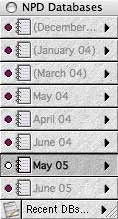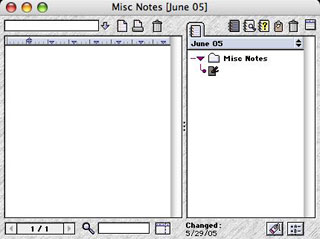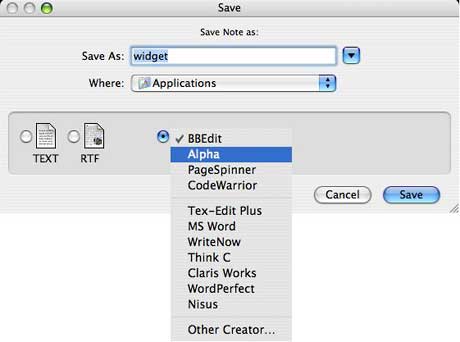Computers are wonderful devices for accessing and storing
information, but organizing and keeping track of the data you have
can be a daunting task.
While researching and reporting the news and getting data for
feature columns and articles, I collect and process a lot of text
each week - press releases, information downloaded from websites,
my own drafts, and hundreds of emails. Eudora does a pretty good
job of managing the latter for me.
As for the rest of it, my data management system, such as it is,
has for some time been based on the very low tech method of dumping
everything into Tex-Edit Plus documents and storing them in a
selection of folders. It's relatively crude, but it has worked
reasonably well for me.
However, I am open to exploring better ways of doing things, so
long as they really are better, and one little desktop database
program that is both pleasingly simple and powerful enough for my
purposes is NotePad Deluxe from Ibrium HB of Sweden. They released
version 2.3.5 of the application last week.
I think the name is a bit misleading, because it makes NotePad
Deluxe sound like a slightly enhanced version of Apple's venerable
NotePad, when it fact it is a much more powerful and richly
featured program.
NotePad Deluxe version 2.3.x supports embedded pictures
(pictures within notes), browser objects (QuickTime movies,
pictures, sounds, etc.), file links/aliases to external files, RTF
import/export, export to single file, Mac/Unix/PC line feeds, trash
system, global scrap, search result listing, database file
structure (the database is now a bundle), Quartz rendering in
OS X 10.1.5 and newer, more than 30 chars in the header,
inline input, supports two/three-button mice in OS X, has
Unicode support in RTF documents and file names, and supports
bundled services (e.g., Excalibur).
Some other desktop database programs I've sampled were powerful
enough but had non-intuitive interfaces and complex file
hierarchies that did not appeal to me.
 NotePad Deluxe, on the other hand, has a single and
simple but very intuitive user interface window, and it stores its
files in its own application folder in database documents that the
user creates, names, and manages. This is neat, slick, and
user-friendly.
NotePad Deluxe, on the other hand, has a single and
simple but very intuitive user interface window, and it stores its
files in its own application folder in database documents that the
user creates, names, and manages. This is neat, slick, and
user-friendly.
For my purposes, I have created a database called "News" into
which I dump all the research data I collect for news briefs.
NotePad Deluxe databases are structured on three levels, all within
a single database metafile:
- The database itself
- Topics
- Notes
You can also have subtopics inside your topics.
Topics use the familiar folder metaphor and iconography within
the in NotePad Deluxe browser window. Notes are analogous to
documents within a folder, but in both cases these are virtual
files contained within the database metafile. In other words, you
can't find NotePad Deluxe Topic folders and Note documents as
separate files using the Finder.
 The NotePad Deluxe interface window is divided into two
side by side panes. On the right is the Browser, in which appear
the virtual Topic folders and Note files within the active
database. On the left is a text field in which data from whatever
Note is currently selected in the Browser field appears. You can
instantly select among Topics and Notes by scrolling and clicking
in the Browser. You can also minimize the window and hide/show the
browser side with a click. There is also a palette of appearance
"skins" in the Preferences.
The NotePad Deluxe interface window is divided into two
side by side panes. On the right is the Browser, in which appear
the virtual Topic folders and Note files within the active
database. On the left is a text field in which data from whatever
Note is currently selected in the Browser field appears. You can
instantly select among Topics and Notes by scrolling and clicking
in the Browser. You can also minimize the window and hide/show the
browser side with a click. There is also a palette of appearance
"skins" in the Preferences.
New Topics and
Notes can be created using menu commands or keyboard shortcuts, and
you can delete existing notes in or topics by dragging them to the
Trash icon in the interface window.
This is all clearly and elegantly integrated - and very
intuitive. NotePad Deluxe also includes built-in support for an
infinite number of notes, styled text, strong encryption
(Blowfish), spell checking (through the Word Services system), Web
links, labeling, sorting, a crash recovery system, topics within
topics, instant scrollbars, other fonts/scripts in header and
browser, and extensive drag and drop. There is also support for
find with replace, local/global text formats, quick-find, labels,
lock, a floating database palette, context menus, and a useful tab
ruler (real tabs) in the main window.
NotePad Deluxe supports the use of multiple databases
simultaneously. Each database, where the notes are stored, is
handled in a separate window. Your notes can be arranged in the
browser, labeled, sorted, locked, printed, encrypted, and so
on.
Simple text documents can be added simply by dropping them onto
the program or into the browser. Drag notes to the desktop or use
the browser popup menu to export selected items.
NotePad Deluxe saves your changes automatically when you go to a
new note or topic. The notes are also saved when another program is
activated. To save time and speed up the program, this kind of
saving is only partial. Therefore changed data could be lost (but
usually not) if the program crashes.
If "Save prior to program switch" is checked in Preferences, all
notes will be completely saved as soon as another program is
activated. The drawback with having this feature activated is that
it will cause a small delay when switching from NotePad Deluxe to
other programs.

I think one of NotePad Deluxe's coolest features is the Export
Text command, which allows you to save the selected as Text, RTF,
or a variety of other formats from a popup menu.
The only bug I've found in NotePad Deluxe is that cut and paste
from WannaBe running in Classic mode doesn't work (you get a
"System Error" dialog) - but interestingly, drag and drop does. One
other shortcoming is that the find function could be better and
fuller featured, but it does the job for simple searches.
I really like this little program, which I have used for several
years in both its classic and OS X iterations (NPD 2.3.3 is
available for Classic users running System 7.5 or later, and the
databases are compatible). While $25 is on the steep end for
shareware, this is such a well engineered, thoughtfully conceived,
and obviously high quality product that it's worth the extra few
bucks. Recommended.
System requirements:
- System 7.5 or later
- Around 1 MB of free memory
Version 2.3.5 fixes some bugs and conflicts with OS X
10.4:
- The size of the browser can now be changed again
- In a few cases, windows were still not activated when switching
to NPD (10.3)
- Better recognition of URLs
- Several print fixes (the same page was printed several times,
missing pages, position of page number, wrong margins, etc.)
- More robust bundles (e.g. NPD will open and fix some broken
DBs)
- The modification date of a DB is only bumped when a "real
change" takes place
- Fixed crashes when activating NPD (frequent in 10.4)
- Several other bug fixes
System requirements:
- Mac OS X 10.0 or higher
- Tiger compatible
NotePad Deluxe is $25 shareware.
Computers are wonderful devices for accessing and storing
information, but organizing and keeping track of the data you have
can be a daunting task.
While researching and reporting the news and getting data for
feature columns and articles, I collect and process a lot of text
each week - press releases, information downloaded from websites,
my own drafts, and hundreds of emails. Eudora does a pretty good
job of managing the latter for me.
As for the rest of it, my data management system, such as it is,
has for some time been based on the very low tech method of dumping
everything into Tex-Edit Plus documents and storing them in a
selection of folders. It's relatively crude, but it has worked
reasonably well for me.
However, I am open to exploring better ways of doing things, so
long as they really are better, and one little desktop database
program that is both pleasingly simple and powerful enough for my
purposes is NotePad Deluxe from Ibrium HB of Sweden. They released
version 2.3.5 of the application last week.
I think the name is a bit misleading, because it makes NotePad
Deluxe sound like a slightly enhanced version of Apple's venerable
NotePad, when it fact it is a much more powerful and richly
featured program.
NotePad Deluxe version 2.3.x supports embedded pictures
(pictures within notes), browser objects (QuickTime movies,
pictures, sounds, etc.), file links/aliases to external files, RTF
import/export, export to single file, Mac/Unix/PC line feeds, trash
system, global scrap, search result listing, database file
structure (the database is now a bundle), Quartz rendering in
OS X 10.1.5 and newer, more than 30 chars in the header,
inline input, supports two/three-button mice in OS X, has
Unicode support in RTF documents and file names, and supports
bundled services (e.g., Excalibur).
Some other desktop database programs I've sampled were powerful
enough but had non-intuitive interfaces and complex file
hierarchies that did not appeal to me.
NotePad Deluxe, on the other hand, has a single and
simple but very intuitive user interface window, and it stores its
files in its own application folder in database documents that the
user creates, names, and manages. This is neat, slick, and
user-friendly.
For my purposes, I have created a database called "News" into
which I dump all the research data I collect for news briefs.
NotePad Deluxe databases are structured on three levels, all within
a single database metafile:
- The database itself
- Topics
- Notes
You can also have subtopics inside your topics.
Topics use the familiar folder metaphor and iconography within
the in NotePad Deluxe browser window. Notes are analogous to
documents within a folder, but in both cases these are virtual
files contained within the database metafile. In other words, you
can't find NotePad Deluxe Topic folders and Note documents as
separate files using the Finder.
The NotePad Deluxe interface window is divided into two
side by side panes. On the right is the Browser, in which appear
the virtual Topic folders and Note files within the active
database. On the left is a text field in which data from whatever
Note is currently selected in the Browser field appears. You can
instantly select among Topics and Notes by scrolling and clicking
in the Browser. You can also minimize the window and hide/show the
browser side with a click. There is also a palette of appearance
"skins" in the Preferences.
 New Topics and
Notes can be created using menu commands or keyboard shortcuts, and
you can delete existing notes in or topics by dragging them to the
Trash icon in the interface window.
New Topics and
Notes can be created using menu commands or keyboard shortcuts, and
you can delete existing notes in or topics by dragging them to the
Trash icon in the interface window.
This is all clearly and elegantly integrated - and very
intuitive. NotePad Deluxe also includes built-in support for an
infinite number of notes, styled text, strong encryption
(Blowfish), spell checking (through the Word Services system), Web
links, labeling, sorting, a crash recovery system, topics within
topics, instant scrollbars, other fonts/scripts in header and
browser, and extensive drag and drop. There is also support for
find with replace, local/global text formats, quick-find, labels,
lock, a floating database palette, context menus, and a useful tab
ruler (real tabs) in the main window.
NotePad Deluxe supports the use of multiple databases
simultaneously. Each database, where the notes are stored, is
handled in a separate window. Your notes can be arranged in the
browser, labeled, sorted, locked, printed, encrypted, and so
on.
Simple text documents can be added simply by dropping them onto
the program or into the browser. Drag notes to the desktop or use
the browser popup menu to export selected items.
NotePad Deluxe saves your changes automatically when you go to a
new note or topic. The notes are also saved when another program is
activated. To save time and speed up the program, this kind of
saving is only partial. Therefore changed data could be lost (but
usually not) if the program crashes.
If "Save prior to program switch" is checked in Preferences, all
notes will be completely saved as soon as another program is
activated. The drawback with having this feature activated is that
it will cause a small delay when switching from NotePad Deluxe to
other programs.

I think one of NotePad Deluxe's coolest features is the Export
Text command, which allows you to save the selected as Text, RTF,
or a variety of other formats from a popup menu.
The only bug I've found in NotePad Deluxe is that cut and paste
from WannaBe running in Classic mode doesn't work (you get a
"System Error" dialog) - but interestingly, drag and drop does. One
other shortcoming is that the find function could be better and
fuller featured, but it does the job for simple searches.
I really like this little program, which I have used for several
years in both its classic and OS X iterations (NPD 2.3.3 is
available for Classic users running System 7.5 or later, and the
databases are compatible). While $25 is on the steep end for
shareware, this is such a well engineered, thoughtfully conceived,
and obviously high quality product that it's worth the extra few
bucks. Recommended.
System requirements:
- System 7.5 or later
- Around 1 MB of free memory
Version 2.3.5 fixes some bugs and conflicts with OS X
10.4:
- The size of the browser can now be changed again
- In a few cases, windows were still not activated when switching
to NPD (10.3)
- Better recognition of URLs
- Several print fixes (the same page was printed several times,
missing pages, position of page number, wrong margins, etc.)
- More robust bundles (e.g. NPD will open and fix some broken
DBs)
- The modification date of a DB is only bumped when a "real
change" takes place
- Fixed crashes when activating NPD (frequent in 10.4)
- Several other bug fixes
System requirements:
- Mac OS X 10.0 or higher
- Tiger compatible
NotePad Deluxe is $25 shareware.

 NotePad Deluxe, on the other hand, has a single and
simple but very intuitive user interface window, and it stores its
files in its own application folder in database documents that the
user creates, names, and manages. This is neat, slick, and
user-friendly.
NotePad Deluxe, on the other hand, has a single and
simple but very intuitive user interface window, and it stores its
files in its own application folder in database documents that the
user creates, names, and manages. This is neat, slick, and
user-friendly. The NotePad Deluxe interface window is divided into two
side by side panes. On the right is the Browser, in which appear
the virtual Topic folders and Note files within the active
database. On the left is a text field in which data from whatever
Note is currently selected in the Browser field appears. You can
instantly select among Topics and Notes by scrolling and clicking
in the Browser. You can also minimize the window and hide/show the
browser side with a click. There is also a palette of appearance
"skins" in the Preferences.
The NotePad Deluxe interface window is divided into two
side by side panes. On the right is the Browser, in which appear
the virtual Topic folders and Note files within the active
database. On the left is a text field in which data from whatever
Note is currently selected in the Browser field appears. You can
instantly select among Topics and Notes by scrolling and clicking
in the Browser. You can also minimize the window and hide/show the
browser side with a click. There is also a palette of appearance
"skins" in the Preferences.
 New Topics and
Notes can be created using menu commands or keyboard shortcuts, and
you can delete existing notes in or topics by dragging them to the
Trash icon in the interface window.
New Topics and
Notes can be created using menu commands or keyboard shortcuts, and
you can delete existing notes in or topics by dragging them to the
Trash icon in the interface window.
